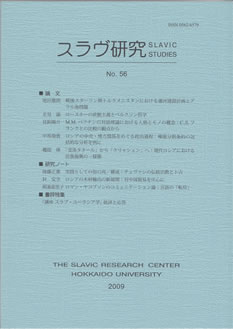戦後スターリン期トルクメニスタンにおける 運河建設計画とアラル海問題
Grandiose Canal Construction Projects in Turkmenistan and the Aral Sea Problem in the Post-War Stalin Period
Author(s): Tetsuro ChidaSubject(s): Politics / Political Sciences
Published by: Slavic Research Center
Summary/Abstract: This article investigates three grandiose canal construction projects in Turkmenistan during the post-war Stalin period and their relationship with the Aral Sea problem. These three projects are the “Karakum Canal,” the “Major (Glavnyi) Turkmen Canal” and the “Diversion of Siberian Rivers” projects. In order to illustrate these projects’ logical structures and their mutual contrarieties, made by central authorities, republican leaders, scientists in the center and technical experts in the construction field, the author approaches these projects from three points of view: 1. political history (both central and republican), 2. history of science and technology (geography, hydrology and hydraulic engineering) and 3. regional studies (Central Asia, especially Turkmenistan). It is not this article’s purpose to “attribute” the Aral Sea problem to the USSR’s water policy’s negative impacts. Rather, the author tries to “depoliticize” these topics. The go signal for the “Karakum Canal” project was given by a resolution of the Soviet Union’s Council of Ministers (CM) on 21 July 1947 (that is, before the beginning of “Stalin’s Nature Transformation Plan,” which started in 1948), although its initial concept dates back to the beginning of the twentieth century (G. Sazonov’s idea). The First Project Document, edited by A. Boltenkov, hydraulic engineer in the Turkmen SSR, was approved on 25 January 1947 at the USSR Gosplan’s Scientific-Technical Expert Commission, which described the Karakum canal as contributing to expeditiously expanding the irrigated lands for cotton production in the southeastern Turkmenistan oasis along the Murgab and Tedzhen rivers. This document referred only to the “future prospect” of this canal’s elongation to Ashgabat and further. Turkmenistan (not “Turkmen”) specialists actively participated in the preliminary work of drafting the document. Turkmen leaders called for the early realization of this “quick-impact” project, but the central Gosplan authorities denounced their requests, accusing them of holding up another construction project of the Tedzhen reservoir, which would eventually be completed in 1950, when the “Great Communist Construction” slogan and the start of the “Major Turkmen Canal” project were announced. As a result, the Karakum Canal project fell back to the second plan, whose beginning the Turkmens had to await until 1954, that is, the next year after Stalin’s death.
Journal: Slavic Studies
- Issue Year: 2009
- Issue No: 56
- Page Range: 1-36
- Page Count: 36
- Language: Japanese

